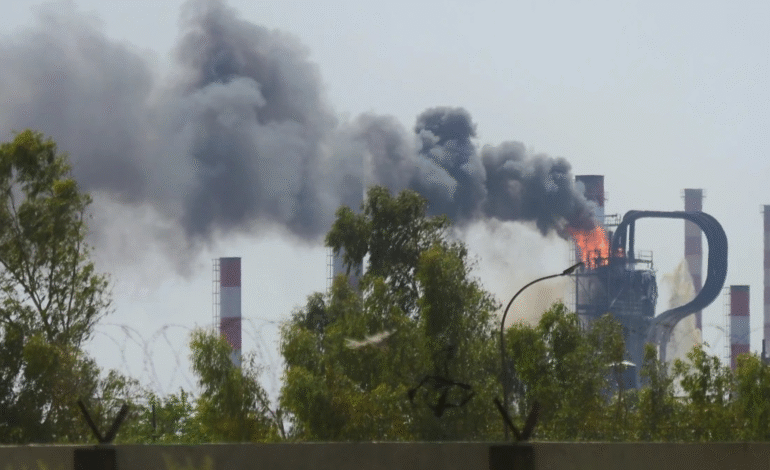Iran Fires Raise Sabotage Fears Amid Israel Tensions

For over two weeks, a wave of mysterious fires and explosions has swept across Iran, triggering concerns among citizens and raising alarm among national authorities. From apartment complexes and oil refineries to major roads and factories, the scale and frequency of the incidents are fueling speculation of coordinated sabotage. While officials publicly downplay the possibility of foreign involvement, behind closed doors, influential Iranian insiders, including a senior member of the Islamic Revolutionary Guard Corps (IRGC), have voiced suspicion that these incidents are not accidents but deliberate attacks.
Iran Faces Series of Blazes Across Vital Sites
Since early July, nearly every day has brought reports of fresh incidents: a deadly fire at the Abadan oil refinery, a blaze near the runway of Mashhad International Airport, and an explosion at a Tehran shoe factory. These events are not isolated or random. Their targets span across vital sectors, indicating a pattern that points beyond the realm of mere coincidence or technical failure.
One refinery fire killed at least one person, raising significant public safety concerns. The fear gripping residents is not just due to the destruction, but also due to the unknown who is behind these attacks, and will they escalate?
Public Statements Vs Private Concerns: The Dual Narrative
In public, Iranian authorities have presented a composed front. They attribute the fires to old infrastructure, equipment malfunctions, or routine operations. Yet, within the corridors of power, the conversation is far more anxious. High-ranking officials, particularly those in the IRGC and national security apparatus, are reportedly convinced that these are acts of sabotage. But declaring such a position publicly could commit Iran to a path of retaliation, a dangerous proposition so soon after a costly war.
This dual messaging underscores Iran’s precarious position. The leadership aims to avoid panic at home while preventing international escalation, particularly with Israel, which Tehran suspects may be behind the operations.
Aftermath of June War: A Nation Still Recovering
The shadow of the recent war with Israel looms large. In June, the two nations clashed directly in a rare and intense confrontation that left Iran’s air defenses, missile launchers, and nuclear infrastructure heavily damaged. Although Iran managed to launch missiles into Israeli territory until the final hours of the cease-fire, the war strained its already overstretched resources.
Rebuilding is ongoing, but these sudden fires and explosions are undermining recovery efforts. The pattern suggests a campaign aimed at further destabilizing Iran’s internal structure at a time of vulnerability.
Israel and Iran: A Long History of Covert Warfare
Though Israel has not commented on the recent incidents, its intelligence agency, Mossad, has a long record of covert operations inside Iran. Over the past decade, cyberattacks, drone strikes, and assassinations of Iranian nuclear scientists have been attributed to Mossad. Iran, in response, has targeted Israeli-linked infrastructure and allies across the region.
In June, Mossad Director David Barnea made an unusual public appearance, signaling a bold posture. “We will be there, just as we have been up to now,” he said, in reference to future operations inside Iran. This statement, delivered so soon after the war, is seen by analysts as both a warning and a declaration of ongoing intent.
Controlled Burns or Covert Operations?
Some Iranian officials insist that several of the fires, including those near Mashhad airport, were part of “controlled burns.” However, critics point out that the scale and location of these fires make that explanation implausible. Others cite historical parallels, including the 2020 Natanz nuclear facility explosion, widely believed to be Israeli sabotage.
Security analysts are urging Iranian leadership to increase vigilance across key infrastructure and implement stricter protective protocols, particularly in energy, transportation, and defense sectors.
Domestic Impact: Heightened Public Anxiety and Distrust
The Iranian public, still recovering from war and economic hardship, now faces yet another wave of instability. Social media is flooded with videos of smoke plumes and speculation about who is behind the attacks. Many are frustrated by the government’s vague explanations and apparent lack of transparency.
This atmosphere of uncertainty threatens to further erode trust in the state. Citizens are questioning the government’s preparedness, especially as infrastructure vulnerabilities become more exposed.
Strategic Silence: Iran Weighs Its Next Move
Iran’s reluctance to formally accuse Israel is strategic. Engaging in another round of open conflict would likely draw further economic sanctions and deepen military fatigue. At the same time, remaining silent could embolden further acts of sabotage.
Tehran must walk a tightrope between showing strength and avoiding escalation. Behind the scenes, intelligence gathering has intensified, and officials are working to identify the perpetrators without provoking an international crisis.
A Region Watches Closely: Implications for the Middle East
Countries across the Middle East, including the UAE and Gulf states, are monitoring Iran’s internal developments closely. Regional security and oil markets are directly tied to Iran’s stability. With major refineries and export facilities potentially compromised, energy prices could be impacted globally.
For the UAE and its neighbors, these events reinforce the urgency of strengthening cybersecurity, surveillance, and regional cooperation to prevent spillover effects or similar covert threats.
Future Outlook: Heightened Security and Geopolitical Tensions
As the investigation continues, Iran is likely to impose stricter controls on media coverage and enforce heavier protection at strategic sites. Meanwhile, Israel’s silence speaks volumes. Analysts expect that the covert battle between the two nations will continue, albeit in shadows, with occasional flashes of visibility such as this current campaign.
The global community, including intelligence agencies in Europe and the Middle East, is also paying close attention. Whether these acts are eventually confirmed as sabotage or remain in the realm of suspicion, the geopolitical impact has already been felt.








1 Comment
[…] Dubai cancelled at least six outbound flights to Iran. These services typically connect Dubai with Iranian cities that attract strong demand from business travellers, tourists, religious pilgrims and expatriate […]
Comments are closed.